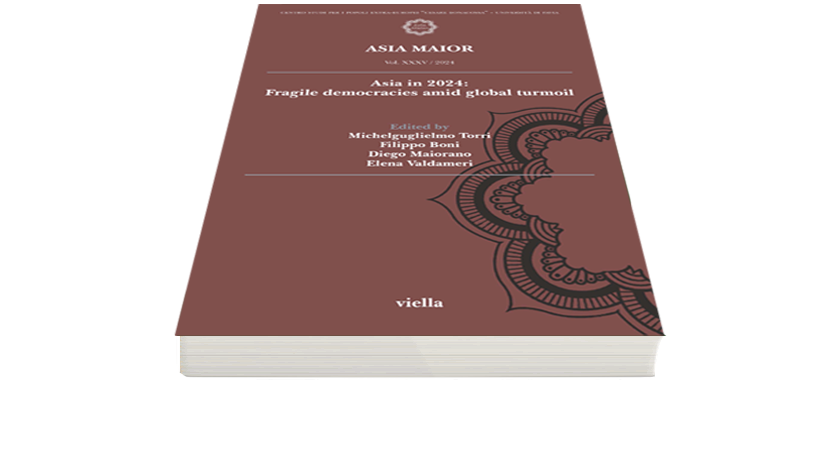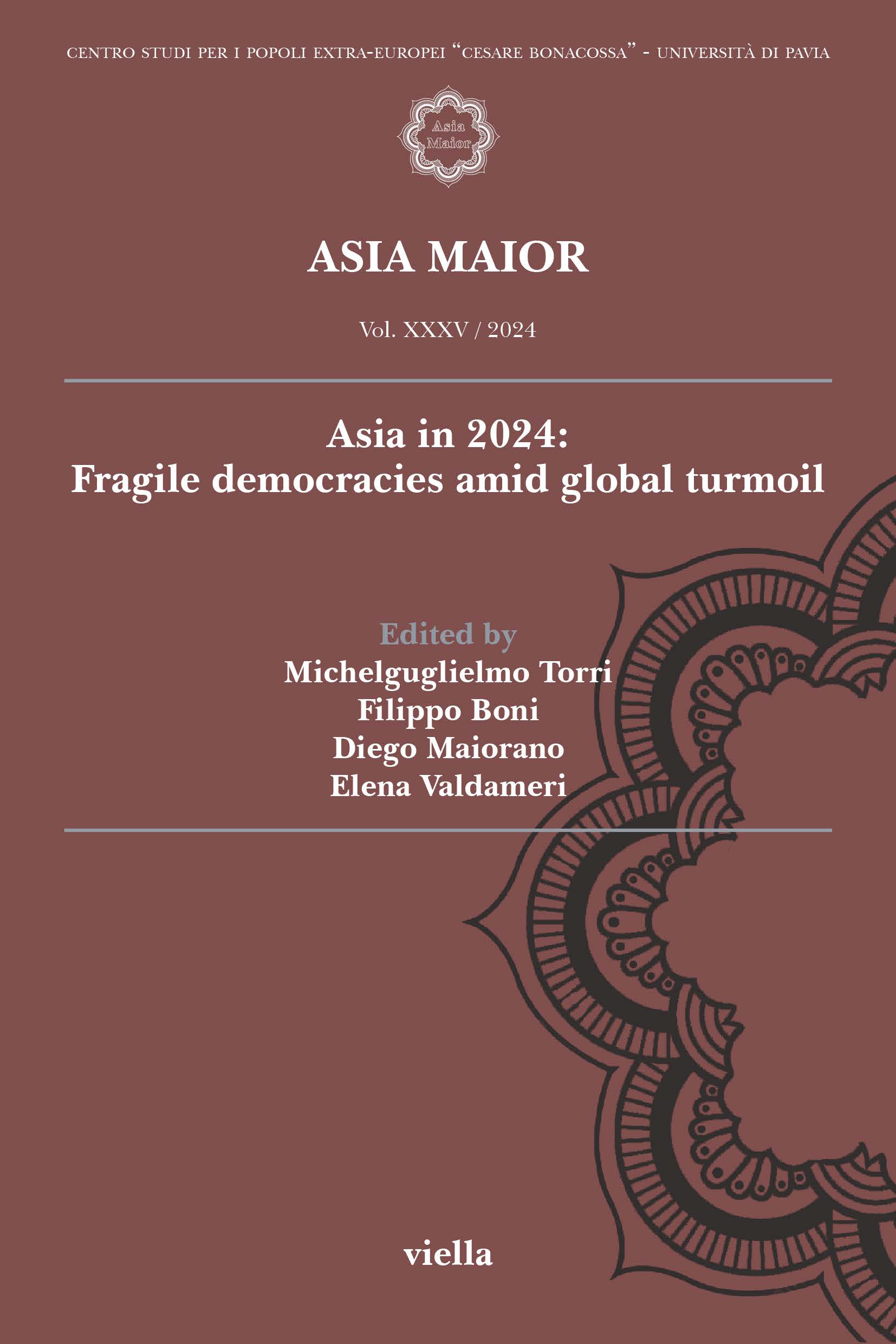Dalits and «Hindu» nationalism: an ex-insider’s perspective
Available also in pdf - Download Pdf(Download count: 624 )
Meghwanshi, Bhanvar, I Could not be Hindu: The Story of a Dalit in the RSS, New Delhi: Narayana Private Publshing, 2020, 236 pp. (ISBN 9788189059934). Translated from Hindi by Nivedita Menon.
This lucidly written riveting autobiography narrates the political journey and activism of an estranged RSS (Rashtriya Swayam-sevak Sangh/National Self-help Organisation) worker from a «low-caste» background, who was initially deeply enchanted by the RSS’s call for the selfless service of the nation. Founded in 1925 to establish India as a «Hindu» nation, the RSS since then has supposedly worked towards promoting «the unity» of Hindu society by equating religious identity with national identity, while overshadowing ethnic and caste identities and issues. Despite lofty ideals and nationalistic idioms, the RSS’s vision has been founded on the strong hatred against Muslims and Christians, considered to be previous «Hindus» who allegedly pledge their loyalties to alien religions. The two religions are considered by the RSS to be imported from outside to lure naïve Indians, therefore, Muslims and Christians cannot be truly Indian. Bhanwar Meghwanshi (hereafter BM), trained in such an ideological environment by a village level RSS shakha (branch) in Rajasthan, quickly rose from being a gananayak (a ground level leader of the people) to the post of the district office chief of the RSS (28), a position in the RSS hierarchy rarely given to people from his background. He grew up hating Muslims even though there was not a single Muslim in his village (56).
Intoxicated with religious nationalism, BM was ready to give his life by participating in the journey of Hindu activists to Ayodhya in the early 1990s –the birthplace of the celebrated Hindu god, Ram–to demolish the Babri mosque and liberate the god’s birthplace from the clutches of Muslims. But rather sooner than later two successive events broke BM’s enchantment with the RSS: (a) the absence of the so-called «upper caste» leaders from the arduous journey (at least one thousand kilometres away from home), which eventually met police brutality (23-25), and (b) refusing to accept food cooked at his place meant to be consumed by «upper caste» leaders of the RSS after the completion of an event held in his village (82-85). The «upper caste» leaders got the food packed up promising to eat it later but threw the food away after crossing the village boundary, so that they did not get polluted by eating food cooked in a «low-caste» household. Upon knowing this incident from a friend who was travelling with the contingent of the RSS, BM could not believe that it could happen to him and set out to find the bitter truth, only to be disheartened by it upon seeing the food lying on the side of the road (82-85). The incident left a deep scar on the mind of BM and ignited the question of the place of Dalits or formerly «untouchables» in the RSS envisioned Hindu nation. BM further writes, «I experienced fully what it meant to be of lower caste. Again and again the thought troubled me: How can this happen? How can the Sangh do this to me? They don’t believe in untouchability, in caste discrimination, they believe all Hindus to be one, they talk of a united Hindu society, and then this kind of hypocrisy?» (83).
The RSS has always been uncomfortable with the question of caste due to the Brahminical control of the organisation. Although it indulges in the politics of religion by terming itself a cultural organisation, the RSS is primarily a caste association of «upper castes», controlled and led by Brahmins, the priestly class of India. Since its foundation, all the heads of the RSS have been Brahmins except one, Rajju Bhaiya, of the Rajput caste. Disgruntled with the RSS approach of neglecting the caste question that he would raise from time to time (86-88), BM eventually began to expose the hypocrisy of its leaders. He opines that Dalits’ dignity and self-pride are denied by the RSS by subtly undermining Dalit political consciousness through false narratives of equality and manipulative slogans of nationalism. He astutely observes that «systematically using religion, culture, and nationalism as popular slogans to mislead the masses, they [the RSS] put us mentally in thrall to them, and we become blind followers» (118). BM reached the conclusion that Dalits are only foot-soldiers for the RSS, exploited to take part in riots and violence against religious minorities, particularly Muslims. As he claims based on his personal experience, ‘the condition of Muslims and Dalits was equally bad, that our enemy («upper castes» sic) was the same and we should fight it together’ (100).
Caste based discrimination never left BM wherever he went. There are numerous anecdotes in the book that recall unfair treatments meted out to him on account of him being a «low-caste» person. For instance, when he took up the teaching job, parents of many children came to the school and tried to stop him from drinking water from the same pot (132). Similarly, he was also denied entry to temples or was forced to hide his caste identity while visiting somebody else’s home (107). Undoubtedly, caste still remains the main source of plight for the majority of Indians, and quite ironically, it is religion which has historically acquired a more prominent place in public discourse among intellectuals, journalists, and politicians alike, who, often not differently from the RSS, consider the question of caste insignificant. BM was constantly reminded that untouchability is «just a small matter» by the «upper caste» RSS members. Their collective silence hurt him the most and he realised that Dalits could never be Hindus. The book here offers a compelling critique of the caste hypocrisy of Indian society in general and of «upper castes» in particular by several astute commentaries towards the end (189-225).
The caste-based discriminatory experiences thus shaped the personal and political outlook of BM about which the rest of the book deftly delves in. The resultant transformation in BM’s mind-set was turning towards rational thinkers and caste critics, such as Phule, Periyar, Ambedkar, who strongly condemned caste practices in Indian society. To take revenge on the RSS, BM even thought of religious conversion as a viable option to leave the caste identity behind but was equally repelled by all organised religions (99-111). He eventually stuck to the humanitarian teachings of these rational thinkers as well as of saints such as Kabir, Buddha, and Ravidas. His engagement with them helped him to get rid of hatred against Muslims instilled by the ideology of the Brahmins of the RSS. He not only became a voracious reader but met with like-minded people on the path of becoming a social activist for the cause of promoting religious harmony, fighting against caste discrimation, and working for raising political consciousness among Dalits. A wide corpus of Dalit literature and saints’ poetries enabled him to critically engage with the question of human dignity and worth. The missionary-like training given by the RSS proved useful for BM to move through various challenging professions from teaching to journalism, which he later took advantage of to further his activism.
The call for the Dalit-Muslim unity led him to found organisations, connect with left-leaning activists, publish magazines and journals, and actively participate in fights against discrimation towards Dalits. He founded civil society organisations like Mazdoor Kisan Shakti Sangathan and People’s Union for Civil Liberties with the aim of increasing public awareness of socio-political issues. He started a magazine called Diamond India to openly fight the unaccounted corruption of the RSS by exposing their casteist, communalist, and corrupt behaviour. Similarly, he promoted many initiaves to show that a lone person can fight important battles if they have self-determination and grit.
The book also sheds a considerable light on the modus operandi of the RSS from its village-level organisation to the social background of its supporters and sympathisers in public offices, including Indian bureaucracy and police. It is still an unregistered organisation, all the orders are oral, nothing in writing. No activist of the RSS has identity cards or receive receipts for their work. The main task of the activists is prachar (propagating the thought of the Sangh) and not vichar, having independent thoughts and opinions. Various surrogate organisations unofficially linked to help the RSS contribute to expanding its network as one of the largest «NGOs» type organisation in the world. The book’s major contribution is to present how a battle against an organisation like the RSS, which promotes bigotry, hatred, and enmity in society on the ground of religion, has to be fought at the caste level, not at the level of religion. By using categories like religion and nation, the organisation and its supporters not only manipulate the hope of social equality among «upper castes» and Dalits but also diminish caste discrimination, as BM claims throughout the book. The clarity of his thoughts, his life-struggles, and learning by experiencing mingled with critical moments of India’s political history make I could not be Hindu a thrilling read. The excellent translation also contributes to the book’s readability.









































